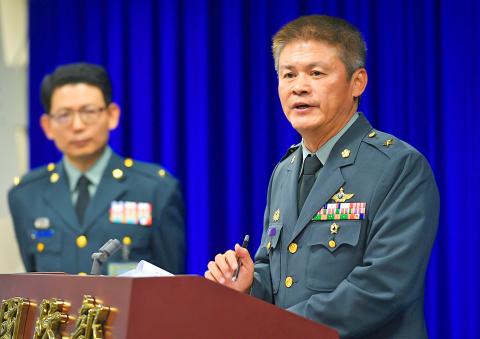The Ministry of National Defense yesterday said that corrosion woes with AH-64E Apache helicopters have led to the aircraft’s grounding, and Boeing, the US manufacturer, has dispatched a special task force to help identity and fix the problem.
Preliminary assessment found serious oxidation on metal components in the tail rotor gearbox, which led to nine of the Apaches being taken out of operations, said Major General Huang Kuo-ming (黃國明), commander of the Army Aviation Special Forces Command.
Twelve of the helicopters were reportedly also grounded due to parts shortages, leaving only eight of the fleet operational.

Photo: Chang Chia-ming, Taipei Times
“We noticed rust corrosion developing in the tail rotor gearbox in March, and notified the US side of the problem at that time. They were quite concerned, and have advised our side to apply several remedial measures to counteract the corrosion,” Huang said.
However, despite taking the remedial measures as part of regular maintenance and service work, the corrosion problem is persisting, which is why Boeing sent a special task force last month to perform a thorough check and safety inspection of all 29 helicopters, he said.
The inspection is ongoing and is expected to be completed by the end of next month, Huang said.
Officials said the Boeing task force is trying to determine into cause of the problem, which could be Taiwan’s wet and high humidity climate, seasonal monsoon rains blowing salt-laden ocean water inland, or improper maintenance and handling by ground service crew.
The AH-64E gearbox is made of a new aluminum-magnesium alloy, while the earlier AH-64D used an older type of aluminum alloy, and Boeing is also investigating the possibility that the corrosion problems stem from the new alloy, Huang said.

Taiwan is stepping up plans to create self-sufficient supply chains for combat drones and increase foreign orders from the US to counter China’s numerical superiority, a defense official said on Saturday. Commenting on condition of anonymity, the official said the nation’s armed forces are in agreement with US Admiral Samuel Paparo’s assessment that Taiwan’s military must be prepared to turn the nation’s waters into a “hellscape” for the Chinese People’s Liberation Army (PLA). Paparo, the commander of the US Indo-Pacific Command, reiterated the concept during a Congressional hearing in Washington on Wednesday. He first coined the term in a security conference last

Prosecutors today declined to say who was questioned regarding alleged forgery on petitions to recall Democratic Progressive Party (DPP) legislators, after Chinese-language media earlier reported that members of the Chinese Nationalist Party (KMT) Youth League were brought in for questioning. The Ministry of Justice Investigation Bureau confirmed that two people had been questioned, but did not disclose any further information about the ongoing investigation. KMT Youth League members Lee Hsiao-liang (李孝亮) and Liu Szu-yin (劉思吟) — who are leading the effort to recall DPP caucus chief executive Rosalia Wu (吳思瑤) and Legislator Wu Pei-yi (吳沛憶) — both posted on Facebook saying: “I

Sung Chien-liang (宋建樑), who led efforts to recall Democratic Progressive Party (DPP) Legislator Lee Kun-cheng (李坤城), was released on bail of NT$80,000 today amid outcry over his decision to wear a Nazi armband to questioning the night before. Sung arrived at the New Taipei District Prosecutors’ Office for questioning in a recall petition forgery case last night wearing a red armband bearing a swastika, carrying a copy of Adolf Hitler’s Mein Kampf and giving a Nazi salute. Sung left the building at 1:15am without the armband and covering the book with his coat. Lee said today that this is a serious

The Ministry of Economic Affairs has fined Taobao NT$1.2 million (US$36,912) for advertisements that exceed its approved business scope, requiring the Chinese e-commerce platform to make corrections in the first half of this year or its license may be revoked. Lawmakers have called for stricter enforcement of Chinese e-commerce platforms and measures to prevent China from laundering its goods through Taiwan in response to US President Donald Trump’s heavy tariffs on China. The Legislative Yuan’s Finance Committee met today to discuss policies to prevent China from dumping goods in Taiwan, inviting government agencies to report. Democratic Progressive Party Legislator Kuo Kuo-wen (郭國文) said